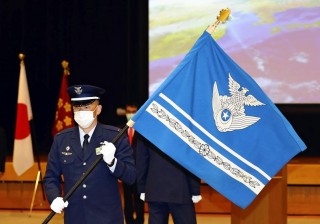Loading
Search
▼ Japan Launches Space Unit Under ASDF
- Category:Event
The Space Operations Squadron, the first space unit of the Self-Defense Forces, was launched Monday.
The unit, which has been set up at the Air Self-Defense Force’s Fuchu base in Fuchu, Tokyo, is tasked mainly with monitoring satellites of other countries and space debris that could collide with satellites. The unit aims for its full operation in fiscal 2023 by deploying a radar system and other equipment.
“As the security environment has changed, it is important to secure superiority in new areas such as space in addition to land, sea and air,” Defense Minister Taro Kono said at a ceremony held at the Defense Ministry to confer the squadron’s flag.
The unit was launched with about 20 personnel, and the number of its members will be increased to about 100 by fiscal 2023. For the time being, the unit will conduct education and training of its members to establish the envisaged monitoring system. A ground-based radar system is under construction in Sanyo-Onoda, Yamaguchi Prefecture, and is scheduled to start full operation in fiscal 2023.
In this fiscal year’s budget, the ministry earmarked for the first time funds to introduce a Space Situational Awareness satellite to monitor situations in outer space, with the aim of launching the satellite by fiscal 2026. The ministry is also seeking cooperation from the Japan Aerospace Exploration Agency.
In outer space, space debris has increased rapidly for reasons such as the abandonment of aging satellites and China’s test to destroy a satellite in 2007. Even a piece of space debris measuring just a few centimeters could affect the operation of a satellite if a collision occurs. The unit will monitor space constantly, including satellites of other countries that make suspicious movements.
Countries have accelerated military expansion in space. China, in particular, has increased efforts to develop so-called “satellite killers” that approach other satellites to destroy them, as well as anti-satellite weapons that block communications with electromagnetic waves, among others, under the banner of aiming to become a “space power.”
It is said that if the functions of a satellite are obstructed in an emergency, communications will be cut off, and by the time the country operating the satellite becomes aware of the obstruction, it will find itself in a situation where there is nothing it can do.
In the National Defense Program Guidelines drawn up in 2018, the government stipulated that the nation will work to build capabilities “to disrupt opponents’ command, control, communications and information” in space. It intends to secure interception ability.
However, the Defense Ministry has been allocated just ¥50.6 billion for space projects this fiscal year.
“The defense budget is limited, while China and other countries are trying to build up their militaries, making it difficult for Japan to deal with the situation on its own,” a senior official of the ministry said.
Given that, the government also plans to strengthen cooperation with other countries, including the United States, which established its U.S. Space Force last year.
The unit, which has been set up at the Air Self-Defense Force’s Fuchu base in Fuchu, Tokyo, is tasked mainly with monitoring satellites of other countries and space debris that could collide with satellites. The unit aims for its full operation in fiscal 2023 by deploying a radar system and other equipment.
“As the security environment has changed, it is important to secure superiority in new areas such as space in addition to land, sea and air,” Defense Minister Taro Kono said at a ceremony held at the Defense Ministry to confer the squadron’s flag.
The unit was launched with about 20 personnel, and the number of its members will be increased to about 100 by fiscal 2023. For the time being, the unit will conduct education and training of its members to establish the envisaged monitoring system. A ground-based radar system is under construction in Sanyo-Onoda, Yamaguchi Prefecture, and is scheduled to start full operation in fiscal 2023.
In this fiscal year’s budget, the ministry earmarked for the first time funds to introduce a Space Situational Awareness satellite to monitor situations in outer space, with the aim of launching the satellite by fiscal 2026. The ministry is also seeking cooperation from the Japan Aerospace Exploration Agency.
In outer space, space debris has increased rapidly for reasons such as the abandonment of aging satellites and China’s test to destroy a satellite in 2007. Even a piece of space debris measuring just a few centimeters could affect the operation of a satellite if a collision occurs. The unit will monitor space constantly, including satellites of other countries that make suspicious movements.
Countries have accelerated military expansion in space. China, in particular, has increased efforts to develop so-called “satellite killers” that approach other satellites to destroy them, as well as anti-satellite weapons that block communications with electromagnetic waves, among others, under the banner of aiming to become a “space power.”
It is said that if the functions of a satellite are obstructed in an emergency, communications will be cut off, and by the time the country operating the satellite becomes aware of the obstruction, it will find itself in a situation where there is nothing it can do.
In the National Defense Program Guidelines drawn up in 2018, the government stipulated that the nation will work to build capabilities “to disrupt opponents’ command, control, communications and information” in space. It intends to secure interception ability.
However, the Defense Ministry has been allocated just ¥50.6 billion for space projects this fiscal year.
“The defense budget is limited, while China and other countries are trying to build up their militaries, making it difficult for Japan to deal with the situation on its own,” a senior official of the ministry said.
Given that, the government also plans to strengthen cooperation with other countries, including the United States, which established its U.S. Space Force last year.
- May 20, 2020
- Comment (0)
- Trackback(0)


